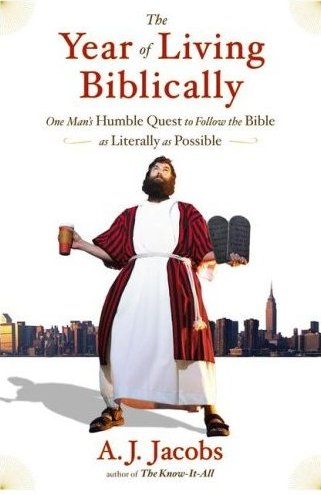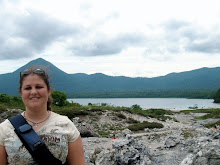So, the first book I thought I would feature in this segment of Bodhaka is a book I finished a few days ago called The Year of Living Biblically One Man's Humble Quest to Follow the Bible as Literally as Possible (2007) by A.J. Jacobs. This is a more fun than scholarly book, but I still think it is bodhaka (probably not really how you use that in a sentence, but work with me! haha).

The Year of Living Biblically is exactly what it sounds like, the author, Mr. AJ Jacobs, who also wrote a book about how he read the entire encyclopedia from A-Z, attempts to follow the Bible as litterally as possible in the hopes of better understanding what it means to do just that: live your life according to the Bible. The book takes you on a year long quest as Jacobs grows a rediculous looking beard, attempts to keep pure on the New York City subway, and interviews all walks of Biblical adherants including, but not limited to, Hasidic Jews, the Amish, Creationists, and Evangelicals from Lynchburg, Virgina (the home of Jerry Falwell's Libery University; Jacobs visited prior to Falwell's death in 2007).

The book is humorous, including an amusing encounter with a Hasidic chicken sacrifice, and also grounded, as you see the author's own humble attempts to be a better person and a better father to his children. This book was written more for a public audience than a scholarly one, but it still addressed some great issues such as how comunities of Biblical literalists live in the US and what their place in our communities are, and also the question of the possibility of following the entire book word for word, when every translation is just a little bit different. I have to say, in addition, I admire Jacobs' attempt to connect with his own Jewish roots and to use the Hebrew Bible, in addition to the Christian Bibles, and to also consult the Talmud and Jewish scholars and Rabbis, as well as Christian scholars and Rabbis. I think it really gives the book a unique perspective, that, I, personally was not expecting. I honestly thought this book was going to be centered around Evangelical Christian communities, but I was plesantly surprised at Jacobs' attempt to include a broad range of the Judeo-Christian literallist experience.
The book, of course, is not without its flaws, but most of them are acknowledged as part of the burden of the task at hand: the impossibility of following every word of the Bible all day everyday. You have to pick and choose because there are just too many rules, and Jacobs does just that, dedicating the first 7 -8 months to the Hebrew Bible (or Old Testament in Christian speak) and the last 2- 3 months to the New Testament (including an interesting interaction with some Red Letter Christians).
Overall, I thought this was a light and fun read about one aspect of the Judeo-Christian experience in America. Bodhaka beach book! (oh the alliteration!)






No comments:
Post a Comment